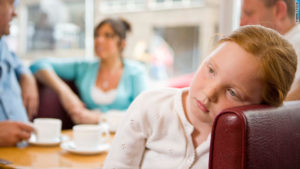WHEN DEPRESSION TOUCHES CHILDREN
 Last month I wrote about the struggle of living in the gray world of depression in a rather general way. We learned that depression can strike anyone regardless of age, background, socioeconomic status or gender. And even though within these groups some symptoms might be shared I would like to break the information down somewhat in the next couple of blogs and discuss in more detail how it affects different groups. With this blog today, I will be talking about children and teens.
Last month I wrote about the struggle of living in the gray world of depression in a rather general way. We learned that depression can strike anyone regardless of age, background, socioeconomic status or gender. And even though within these groups some symptoms might be shared I would like to break the information down somewhat in the next couple of blogs and discuss in more detail how it affects different groups. With this blog today, I will be talking about children and teens.
CHILDREN AND TEENS
We often think of childhood as simple and carefree — So you might be surprised to learn that children do experience depression. All children experience ups and downs while growing up, but for some, the downs aren’t commonplace — they are the signs of depression. About 5 percent of children and adolescents in the general population suffer from depression at any given time. Children under stress, who experience loss, or who have attentional, learning, conduct or anxiety disorders are at a higher risk for depression. Depression also tends to run in families.
The symptoms of depression tends to manifest differently in children than it does in adults. Before puberty, girls and boys are equally likely to develop depression. However, after puberty the rate is higher for girls. Typically, children and teens will experience fatigue, irritability and other physical complaints (aches and pains) which they are more likely to complain about than to say they are depressed.
Because normal behaviors vary from one childhood stage to another, it can be difficult to recognize and diagnose depression in children. It can be hard to tell if a child is just going through a temporary phase or if he or she is really suffering from depression. Sometimes a teacher might bring it to the parents attention that their child’s behavior seems to be a “little off.”
A young child may pretend to be sick, refuse to go to school, be especially “clingy” to a parent, or worry that a parent may die. They may express feelings of hopelessness and helplessness by negative self-talk with phrases such as “I am bad” or “I can’t do anything right.” Depression distorts normal thinking. It can shrink a child’s self-worth. They may feel worthless or unlovable, useless or stupid. The child feeling sad might want to hide themselves in a place where they feel safe and don’t have to interact with anyone.
The teen years as all parents can attest can be rather tough. Occasional bad moods are to be expected, but depression is different. Teens may sulk, be irritable, angry, get in trouble at school and engage in risky behavior. So how do you know if your child is just “being a teenager” or is really depressed?
Consider how long the symptoms have been present, how severe the symptoms are, and how different the teen has been acting from his or her usual self. Teens with depression may also have other disorders such as anxiety, eating disorders, or substance abuse.
If you suspect a child or teenager in your life is suffering from depression, speak up right away. Children and teenagers rely on the adults in their lives to recognize their suffering and get them the treatment they need. Depression often persists, recurs, and continues into adulthood, especially if left untreated.
WHAT TO DO
- Talk to your child and listen carefully.
- Pay attention to the duration of the symptoms.
- Offer emotional support. Your child needs your understanding, patience and encouragement.
- Never discount the feelings expressed by your child. Point out realities but offer hope.
- Never ignore comments about suicide.
- Take your child for a medical checkup. This way you can rule out any medical conditions that might mimic depressive symptoms.
- Get a comprehensive evaluation from a mental health professional. If medical reasons have been ruled out it’s important to take your child to a practitioner who specializes in mood disorders. Many mental illnesses share some of the same symptoms. So it’s important to get the right diagnosis.
- Get effective treatment. Play therapy and family therapy are helpful for toddlers and preschoolers while individual talk therapy is helpful for teens. Sometimes medications may be necessary along with therapy.
- Remind your child that with time and treatment, the depression will lift.
A NOTE TO PARENTS
As a parent dealing with a child who suffers from depression, it’s easy to focus all of your energy and attention on that child. Meanwhile you may be neglecting your own needs and the needs of other family members. Keep in mind that it’s really important to take care of yourself as well as taking care of the rest of the family.
Reaching out for much needed support is crucial for everyones well-being as you navigate through this difficult time. Enlist the help of family and friends and/or join a support group. There will be times where you will feel overwhelmed, frustrated, helpless, or angry. And that’s okay and to be expected. Having your own support system in place where you can talk about your feelings will help you to stay healthy and positive as you work to help your child.
